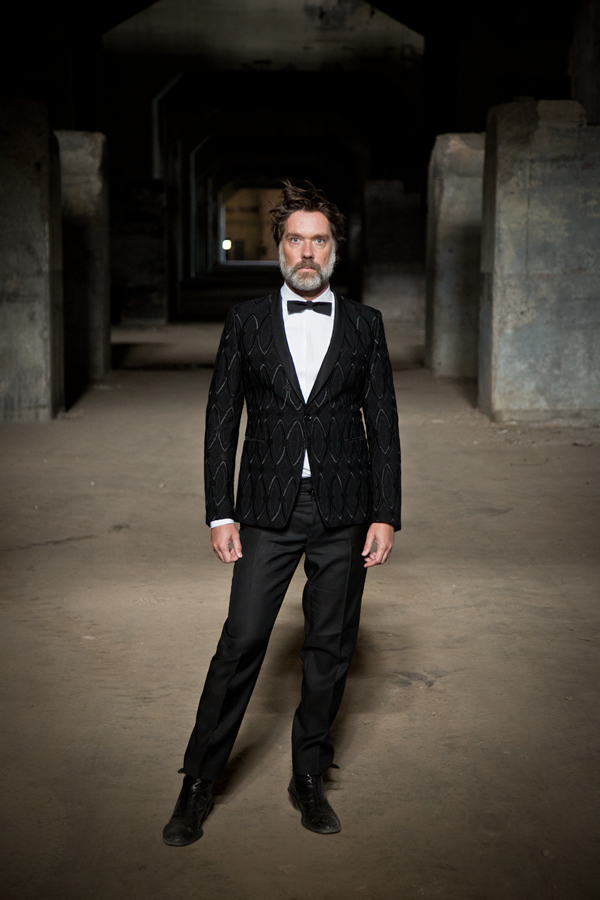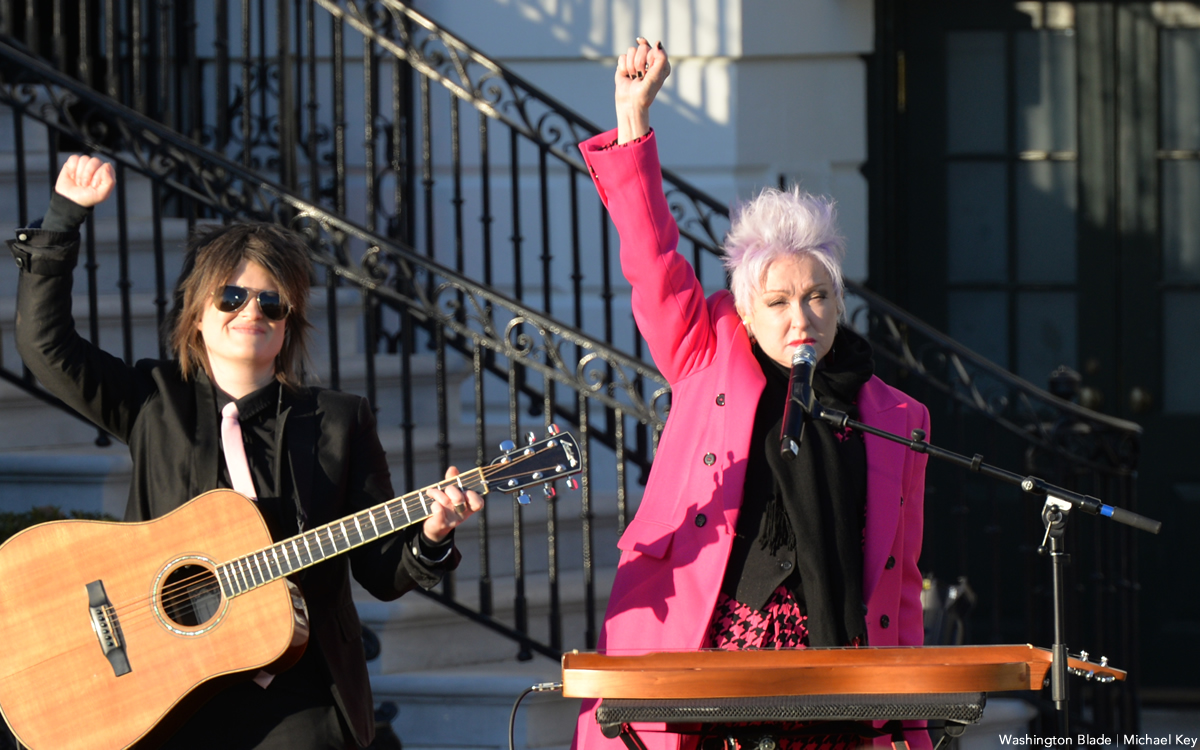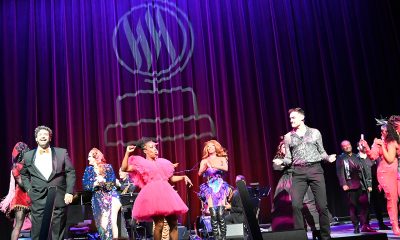Music & Concerts
Musical adventurer Rufus Wainwright returns to touring, plays D.C. Sept. 28
From Judy to Shakespeare to opera, gay wunderkind embraces it all

Rufus Wainwright and Jose Gonzalez
Unfollow the Rules in the Local Valley Tour
The Anthem
901 Wharf St., S.W.
Tuesday, Sept. 28
8 p.m. (doors: 630)
$55-75
ticketsonsale.com
theanthemdc.com
rufuswainright.com
After some artistic detours — in 2018, a second opera; before that, an album of songs based on Shakespearean sonnets in 2016 — Rufus Wainwright returned to his “regular” music in July 2020 with the release of his 10th studio album “Unfollow the Rules,” which was critically embraced and nominated for a Grammy.
A live album of the “Unfollow” material dubbed “The Paramour Sessions” was released Sept. 10.
Wainwright, 48, spoke to the Blade by phone on Sept. 1 from Nashville where he had a City Winery show that night as part of his “Unfollow the Rules Tour.” He joins Jose Gonzalez for the “Unfollow the Rules in the Local Valley Tour,” a co-headlining, 10-city mini-tour, next week. They play The Anthem on Sept. 28. Then Wainwright, who’s been publicly out since his eponymous debut album dropped in 1998, will resume his solo tour next month in the U.K. His comments have been slightly edited.
WASHINGTON BLADE: You’re back on the road. What have the audiences been like?
RUFUS WAINWRIGHT: Well, they’re very excited. … There’s definitely a palpable sense of appreciation and excitement. And it’s good to be back.
BLADE: Do you feel safer singing more of the new album now that it’s been out a year and people have had time to absorb it? Is that easier than trying to sing more of it when it’s just out?
WAINWRIGHT: I definitely enjoy the whole kind of common knowledge thing now that exists with this album. And certainly having this other record, “The Paramour Sessions,” to promote as well, which is just another take on some of the same material. One can also go on a bit of a deeper dive. You know, this album actually did very well critically, it was nominated for a Grammy and a lot of people consider it a seminal work for me. I think it can handle that stretch.
BLADE: Do the new songs dovetail fairly naturally with your older songs in a set?
WAINWRIGHT: Yeah, I mean, this album is very much related to my first album. I’m not going to be doing my first album in the show, but it’s kind of a return to my California roots. You know, where I began my career over 20 years ago. The songs are answers in a way to some of the questions raised on the first album. … I’m not singing them back to back or anything, but a lot of my fans have followed me from the beginning so we all get it.
BLADE: How did “Unfollow the Rules: The Paramour Sessions” come about?
WAINWRIGHT: When the album was released, we still wanted to do something special online so we made this film doing a lot of the songs with a smaller ensemble at this incredible Hollywood mansion. This was at the height of the pandemic, possibly slightly illegally in the sense that we weren’t necessarily supposed to be working. But people needed to do something, you know, to get their heads out of the chaos. This was last summer during the Black Lives Matter protests and just the heat of those fires that were about to ignite, there was a very intense atmosphere and I do feel strongly that some of that drama is possibly on the recording. At least I think there’s this sort of depth there that can only come out of something like that.
BLADE: Did it seem relatively easy returning to quote-unquote pop music after writing opera?
WAINWRIGHT: Yeah. One of the great gifts of me writing opera, which I will continue to do intermittently, is that it gave me a whole new appreciation of where I came from and all the freedoms I have in the pop world. I’m very grateful for my work in the songwriting universe and all the freedom that comes with it.
BLADE: Are you co-headlining this tour with Jose Gonzalez?
WAINWRIGHT: Yes. It will be nice to be out with a brilliant songwriter and singer. It’s been a while since I’ve done this sort of thing. When I began my career, it was more the norm to be part of a lineup.
BLADE: Do you know him? Will you sing anything together?
WAINWRIGHT: We haven’t met but I think it will be a very emotional meeting in a way, because it’s been a long time coming.
BLADE: What was it like revisiting the Judy (Garland) album last summer and on her birthday no less? (Wainwright recreated Garland’s famous live Carnegie Hall album in 2007.)
WAINWRIGHT: It was a thrill. How many people can claim to have sang the same songs in the same room where she recorded a lot of them and on the actual microphone that she used with Renee Zellweger (who won an Oscar for the 2019 biopic “Judy”) as a captive audience. So yeah, I just felt a lot of gratitude and felt very privileged to be able to go on that journey. So yes, in honor of Judy, but the main thread that I’m actually worshipping is the material itself whether it’s Gershwin or Berlin. They inspire me, as a songwriter myself, to keep the bar fairly high.
BLADE: You’ve hinted in other interviews that you want to write a Broadway musical and perhaps a ballet. You’ve written two operas. Where does this drive come from to conquer such ambitious and disparate art forms?
WAINWRIGHT: Well obviously with COVID, touring was suspended for a while, so it was a chance to try to advance the Broadway jalopy, which I’ve been trying to do for a while. There are about three or four projects that I have in the works that unfortunately I can’t talk about too much, but what I can say is that there is a wholehearted effort going on to, you know, secure my place on the Great White Way one way or another. It’s something people have been after me to do over the years because they say my music already has that sensibility. So I’m finally kind of doing my homework now.
BLADE: And whether it’s Broadway or opera, what are the gatekeepers like in those arenas? Since you’re a known entity, is it easy to at least get a pitch meeting? How does it work?
WAINWRIGHT: Well they’re very different. I’m happy that I went into the opera world first. My first opera has been done seven times all over the world and my second one has other productions coming, so it’s been a success. Not everybody adores my work, but it made an impact and it seems to be continuing on so that’s all you can ask for anyway. I’m happy I did it, but it’s a very, very tough battle. The standards are very, very high, which is actually a good thing. With Broadway, I think there’s a whole financial element to it where people are looking to make a fortune off of these shows, so that’s kind of new for me and something I have to be cognitive of.
BLADE: You said in another interview that the classical world could be poisonous at times. How so?
WAINWRIGHT: I meant it was the opposite of what I believed it was going to be. I had a very nice view of the classical world, and I’ve adored opera for most of my life. I thought I would be able to unleash my talents and it would be accepted and appreciated and I would be, you know, brought into the fold when in fact, it was the opposite. They were very, very dubious to me and very protective of their sacred cows, so it was a real rude awakening. It’s a very cliquish environment and everybody kind of knows everybody. So if somebody wanted to poison the well, they can and then it spreads to this massive disease about you and they’re able to spread it very easily. So the happy story is that it survived and thrived and I guess what doesn’t kill you makes you stronger.
BLADE: Whether they’re fans or not, most people would concur your songs are fairly intelligent. Are art and culture and society in general getting dumbed down a little more each year?
WAINWRIGHT: I think there are some aspects that need some attending to for sure. I mean in the pop songwriting world, I’d say lyrics are really under threat. When you look at the generation that’s about to exit — people like Bob Dylan, Joni Mitchell, and the ones who have left us, like Bowie, and so forth, lyrics were really kind of the most brilliant jewel in the art form and now they’re just so throwaway. I don’t profess to be the world’s greatest lyricist or anything, but I do try very hard and I wouldn’t say the age we’re in is a golden age of the word. But maybe there are other art forms, like fashion or something perhaps, that are at their peak now, who knows?
BLADE: Was it hard to maintain sobriety during lockdown last year?
WAINWRIGHT: No. My wonderful husband (Jorn Weisbrodt, whom Wainwright married in 2012), he’s not about alcohol at all. He doesn’t drink because he just doesn’t need to. And I do Zoom meetings here and there. So I thank my lucky stars it wasn’t. It would have been hard to contend with alcohol as well as COVID.
BLADE: How’s your daughter? What’s she excited about these days? (Wainwright’s daughter Viva is 10)
WAINWRIGHT: Oh, she’s into horseback riding. She loves Tina Turner. She loves to draw. She’s actually really happy to be back in school and hanging out with her friends.
BLADE: How often do you talk to your dad on average? (Wainwright is the son of Loudon Wainwright III, an acclaimed singer/songwriter.)
WAINWRIGHT: We try to talk once a week. We’ve kind of made it into this calendar item and it works really well that way. Just to touch base and see how we’re doing. Other times we’ll get into more sensitive territory. I think especially since losing my mother, I’m just aware that it’s a finite amount of time these people are going to be around, so you might as well spend time with them while you can.
BLADE: How closely do you follow current pop music? Is there anybody who particularly excites you?
WAINWRIGHT: I do. I like Perfume Genius and Lana Del Rey. And I like The Weeknd. When those songs come on, I’m like, “Wow, that’s a real hit.” I admire that because I’ve never been able to crack that nut, nor do I think I probably ever will.

Music & Concerts
Washington chorale kicks off Christmas with vibrant program
‘Thine Own Sweet Light’ concerts planned

The full Washington Master Chorale will return for its annual holiday concert tradition with “Thine Own Sweet Light” on Friday, Dec. 19 and Sunday, Dec. 21 at St. Ann’s Catholic Church (D.C.) and Church of the Epiphany (D.C.).
The concert will feature the rich sounds of the 50-voice, a cappella chorus performing lush, seasonal choral music inspired by the theme of light. Highlights include Edvard Grieg’s “Ave Maris Stella,” Eric Whitacre’s “Lux Aurumque,” and Christopher Hoh’s “Holy, Holy, Holy is the Lord God of Hosts.” The program will also present a new work by Barcelona composer Josep Ollé i Sabaté, along with charming holiday folk songs and seasonal favorites.
For more details, visit the Washington Master Chorale website.
Music & Concerts
Queer mega stars (and allies) ready to take D.C. stages this fall
Watch LGBTQ icons light up stages across the DMV as they sing, dance, and drag their way through spectacular shows.

One of the best ways to welcome fall is by catching LGBTQ performers (and their allies) lighting up some of the D.C. area’s biggest stages. From country and pop to drag and rock, the season is packed with shows you won’t want to miss.
Maren Morris – The country, rock, and pop diva—known for hits like “The Bones” and for standing up against Nashville’s anti-LGBTQ voices—takes the stage at Wolf Trap (1551 Trap Rd, Vienna, Va.) on Friday, Sept. 12 at 8 p.m. Tickets start at $64.
RuPaul – The mother of modern drag and host of “RuPaul’s Drag Race” will spin a DJ set at Echostage (2135 Queens Chapel Rd NE) in Northeast D.C. on Sept. 20. Before RuPaul swaps wigs for headphones, Trade and Number 9 owner Ed Bailey will warm up the decks. For tickets and details visit echostage.com.
Conan Gray – The queer pop prince, celebrated for his Gen Z anthems like “Heather” and “Maniac,” brings his Wishbone Pajama Show to EagleBank Arena in Fairfax, VA, (4500 Patriot Cir) on Sept. 20 at 8 p.m. Tickets start at $113. For more info visit shop.conangray.com/pages/tour.
All Things Go Music Festival – With a lineup that includes Noah Kahan, Lucy Dacus, Kesha, Clairo, Doechii, and more, the beloved LGBTQ-friendly festival takes over Merriweather Post Pavilion (10475 Little Patuxent Pkwy, Columbia, Md.) Sept. 26–28. For tickets and details visit allthingsgofestival.com.
BERTHA: Grateful Drag – This unique tribute brings drag artistry and the sounds of the Grateful Dead to The Atlantis (2047 9th St NW) on Sept. 27. Tickets start at $47 at theatlantis.com.
Peach PRC – Rising Australian pop star and out lesbian, whose confessional tracks like “Perfect for You” and “Forever Drunk” have made her a queer TikTok darling, performs at The Atlantis on Sept. 29 at 6:30 p.m. The show is general admission only. Additional details are on theatlantis.com.
Addison Rae – The TikTok star-turned-pop princess, who’s crossed over into music with glossy hits like “Diet Pepsi” brings her sold out show to The Anthem (901 Wharf St., S.W.) on Sept. 30. Tickets are sold out, but resale options start around $80. For more info visit theanthemdc.com.
The Rocky Horror Picture Show 50th Anniversary – Celebrate the cult classic that’s been a queer midnight-movie staple for decades, with Barry Bostwick (a.k.a. Brad Majors) at the Warner Theatre (513 13th St., N.W.) on Oct. 2 at 8 p.m. Tickets start at $41 via Ticketmaster.
Chaka Khan, Patti LaBelle, Gladys Knight & Stephanie Mills – Four legends, one stage. Between Khan’s funk, LaBelle’s soul, Knight’s R&B, and Mills’ powerhouse vocals, this concert at Capital One Arena (601 F St NW) on Oct. 3 at 8 p.m. promises pure diva magic. Tickets start at $103. For more details visit capitalonearena.com.
Lorde – Joined by The Japanese House and Chanel Beads, the Grammy-winning New Zealand singer-songwriter behind “Royals” and “Solar Power” returns to The Anthem on Oct. 4 at 7 p.m. Lorde has long been embraced by queer fans for her dreamy pop and subversive lyrics. For more info visit theanthemdc.com.
Andy Bell (of Erasure) – The British queer rock icon, best known for synth-pop classics like “A Little Respect” and “Chains of Love,” brings his Ten Crowns Tour to the Lincoln Theatre (1215 U St., N.W.) on Friday, Oct. 17 at 8 p.m. Tickets are $90.45.
Doechii – The self-described queer “Swamp Princess”—and WorldPride 2025 headliner—continues her breakout year with the Live from the Swamp Tour at The Anthem on Oct. 21 at 8 p.m. Known for blending rap, R&B, and avant-garde performance art, Doechii is one to watch. Tickets start at $153.
Neon Trees – The out-and-proud Utah rockers behind “Everybody Talks” and “Animal” perform at the Lincoln Theatre on Friday, Oct. 24 at 8 p.m. Lead singer Tyler Glenn, who came out publicly in 2014, has become a strong queer voice in alternative rock. For tickets and info visit impconcerts.com.
Sasha Colby – The “RuPaul’s Drag Race” Season 15 winner strips down on the Stripped II Tour at the Warner Theatre on Nov. 2 at 8 p.m. Tickets available now on Ticketmaster.
Lola Young – The bisexual indie-pop sensation, whose raw songwriting has earned her millions of TikTok fans and multiple chart soaring hits visits The Anthem on Nov. 9 at 8 p.m. Tickets are still available.
Opera Lafayette
Featuring Mary Elizabeth Williams as Dido
+ Elijah McCormack, Chelsea Helm
Oct. 16, 7:30 p.m.
Sixth & I
PostClassical Ensemble
The Pale Blue Do: A Musical Voyage Inspired By Nature
Featuring National Geographic’s Enric Sala, Guest Curator
Wednesday, November 19, 7:30 p.m.
Terrace Theater
Washington Concert Opera
Starring Kate Lindsey, Theo Hoffman, John Moore, and Fran Daniel Laucerica
Nov. 23, 6 p.m.
Lisner Auditorium
Washington Master Chorale
An intimate a capella concert taking place in an architectural jewel, featuring cherished choral gems from Anglican and Catholic tradition and early American hymns. The concert will also present the world premiere of Christopher Hoh’s Holy, Holy, Holy is the Lord God of Hosts, and hymn singing featuring Robert Church, organist and choirmaster at St David’s.
Oct. 18, 7:30 p.m.
October 19, 5 p.m.
St. David’s Episcopal Church
Music & Concerts
Cyndi Lauper ready to have fun in Virginia
Superstar to bring final leg of farewell tour to Jiffy Lube Live

Superstar Cyndi Lauper will bring the final leg of her farewell tour “Girls Just Wanna Have Fun” to Bristow, Va., on Thursday, July 24 at Jiffy Lube Live.
Lauper’s international Farewell Tour – her first major headlining run in a decade – kicked off in North America last October, and included her first time ever headlining (and selling out) Madison Square Garden. Lauper’s performances have earned raves from the New York Times, Rolling Stone, Billboard, and many more, and surprise guests have included Chaka Khan, Sam Smith, and Hayley Williams. The tour just visited the U.K. and Europe, and will head to Australia and Japan in April.
Tickets are available on Live Nation’s website.
-

 Baltimore5 days ago
Baltimore5 days ago‘Heated Rivalry’ fandom exposes LGBTQ divide in Baltimore
-

 Real Estate5 days ago
Real Estate5 days agoHome is where the heart is
-

 District of Columbia5 days ago
District of Columbia5 days agoDeon Jones speaks about D.C. Department of Corrections bias lawsuit settlement
-

 European Union5 days ago
European Union5 days agoEuropean Parliament resolution backs ‘full recognition of trans women as women’




















